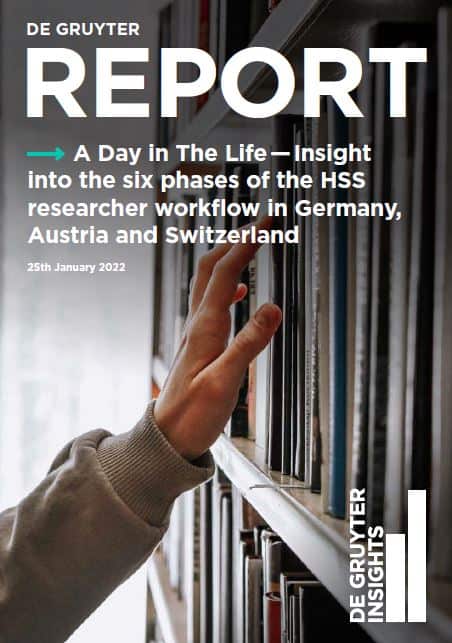How Humanities and Social Science Scholars Work: New Research Points to the Prevalence of Traditional Methods
A new study conducted by De Gruyter’s insights team indicates that traditional working methods prevail among humanities and social science scholars. Their reasons, however, are unlikely to lie in a resistance to change.
It’s often assumed that everyone wants and needs the latest technologies, tools and digital innovations in order to streamline their work processes and improve their “productivity”. But a study launched today from De Gruyter’s insights team into the research habits of humanities and social science (HSS) scholars finds this isn’t always true.
Regardless of age and career stage, the study finds that HSS authors remain advocates of traditional ways of working – but not because they are resistant to adopting new working methods but rather, because their needs are different.
Understanding the HSS Workflow
Most of what we know about how academics work day-to-day and the tools and technologies they use to manage projects – otherwise known as their “workflow” – comes from academics in the fields of science, technology and medicine (STM). This work is valuable and has provided us with a far more advanced understanding of how STM scholars work. At De Gruyter we primarily publish HSS books and journals, so we wanted to know more detail about the research habits and workflows of these scholars – a vitally important group.
*Lea Bauer, a Bachelor’s student of media publishing at HDM Stuttgart conducted the research as part of her Bachelor’s thesis: ‘Typische Phasen des wissenschaftlichen Arbeitsprozesses von Sozial- und Geisteswissenschaftlern unter besonderer Berücksichtigung der Bedeutung von anfallenden und verwendeten Daten.‘
Conducted across Germany, Austria and Switzerland in April and May 2021, the research surveyed 641 HSS scholars and included in-depth interviews with 14. The project was the result of a collaboration between De Gruyter’s insights team and a Bachelor’s student at the media publishing school at HDM Stuttgart*. The research involved asking scholars a range of practical questions about how they conducted their research day-to-day. Academics were also asked what aspects of their roles they found most challenging and what their understanding of open data and open access was as it relates to their fields.
Traditional Methods Win Out
Broadly, the findings paint a picture of an HSS research community which uses tried and tested project management and writing tools and prefers traditional channels of communication, promotion and search. The study shows that most HSS researchers prepare, plan, structure and write their material in a way that makes little use of the multitude of digital collaboration platforms and reference management tools now on the market.
Indeed, 94% of social scientists prefer to use Microsoft Word to write their manuscripts with the vast majority of those surveyed also using Word to manage references. Email remains overwhelmingly the main communication channel of choice too with 96% of academics preferring this method. Email was popular regardless of age or career stage and also used extensively for the promotion and sharing of research and for collaborating with colleagues.
Staying Analogue
The research also finds that humanities researchers in particular tend to work alone and primarily access information through their library website and Google Scholar. Indeed, 89% of the scholars surveyed access information via their library sites, but almost half (45%) also claim to go directly to the author to request articles and references.
“Humanities researchers especially value working in physical spaces and being with physical objects.”
HSS scholars also displayed a strong preference for analogue ways of working. 11 of the 14 academics interviewed for the research said they significantly preferred physical library searches over others forms. While search and discovery through Google in particular remains a vital element of any researcher’s working life – humanities researchers especially value working in physical spaces, such as libraries, and being with physical objects, such as books or archives.
The Lure of the Physical World
The research indicates that HSS scholars simply prefer visiting libraries, collections and archives. Many cherish the opportunity to see, touch and handle physical books, artefacts and objects – something that the pandemic has denied many.
Find out how the pandemic has impacted (HSS) scholars around the world in our previous insights studies.
While scholars praise eBooks and online resources for their convenience, many say that physical books often make the research and reading process a more engrossing, pleasurable experience. For many, eBooks can be tough to work with and hard on the eyes.
Many researchers print out online documents before reading them and organise their work without the help of any reference management programmes whatsoever. Indeed, one in four humanities scholars still draft their manuscripts in long hand.
No “One Size Fits All” Approach
While there will be many reasons why individual HSS researchers remain invested in tried and tested research tools and traditional ways of working, we assume they do because these methods work for them. While it’s true that in many cases, STM scholars use more advanced digital workflow tools to execute and evaluate their data and collaborate, this may be because their needs are different. HSS researchers are not resistant to change – they simply don’t need the tools and technologies that many STM scholars do.
Our understanding of academic workflow must take into consideration that different academics in different fields have different needs and not adopt a “one size fits all” approach.
Our research confirms that HSS scholars thrive in physical places, surrounded by books, archives, collections and artefacts. They search online, of course, but they want to get lost in primary sources, read original texts, discover fresh areas and unveil new and exciting research questions.
While digital innovation can advance research in many fields, it seems a library or archive, a pen and a notebook are the only things some scholars truly want and need.
Download the full report here:
[Title image by eclipse_images/E+/Getty Images]
